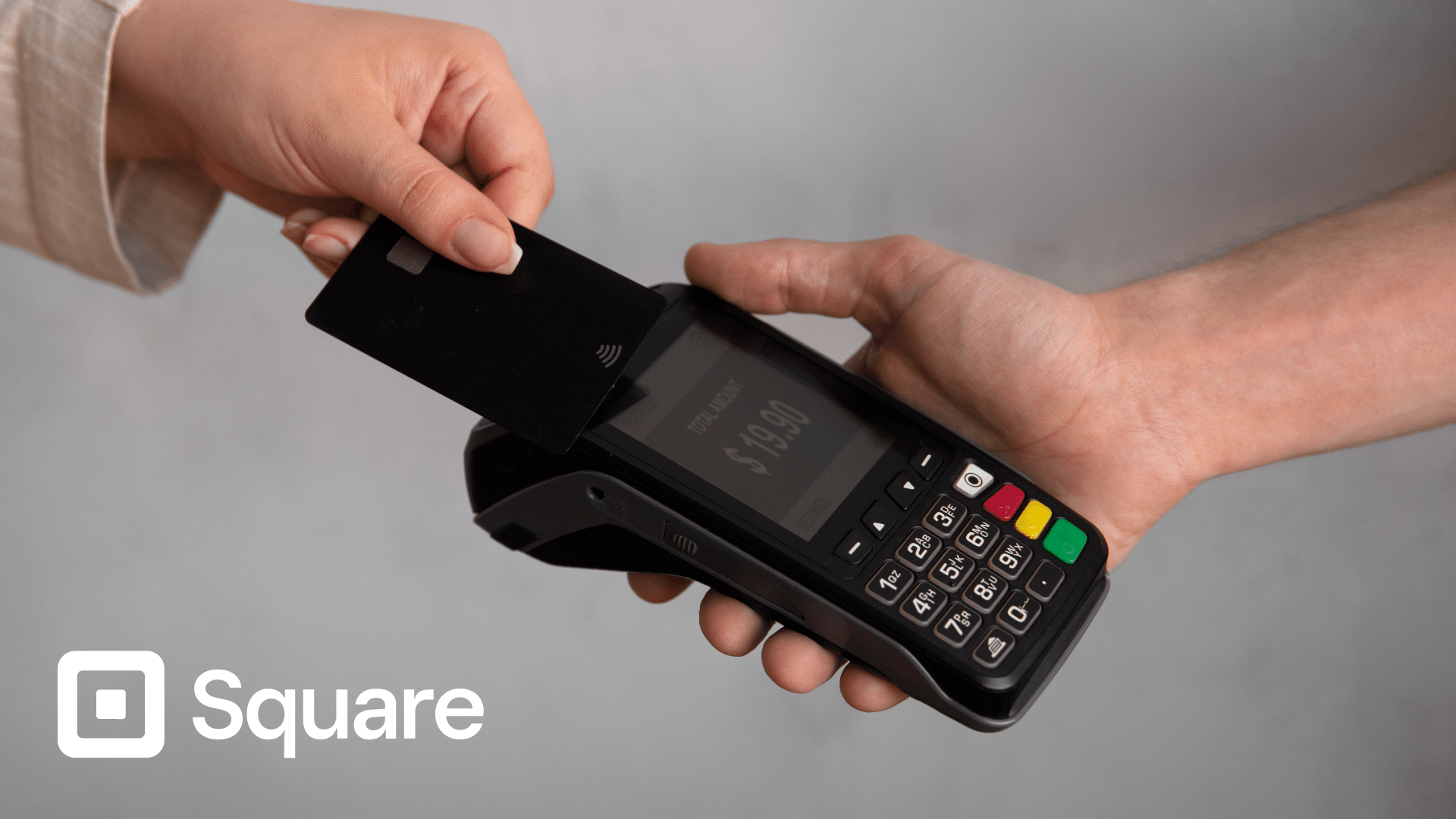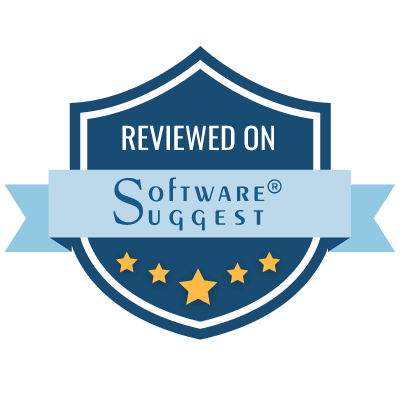Looking for an alternative to Square POS? Whether you’re seeking more advanced features, better customer support, or a system tailored to your business needs, we’ve got you covered.
This article will explore the top Square alternatives, comparing their key features, pricing, and benefits. These POS systems offer robust solutions to enhance your business operations, from retail to restaurants. Discover the best fit for your business and take the next step toward a more efficient point of sale experience. Read on to find the ideal POS system for you.
Square POS Overview: What is it?
Square POS offers a user-friendly and mobile card reader and point of sale system ideal for small businesses and startups. It is free for basic features and allows retailers to accept credit card payments, manage inventory, and track sales through a smartphone or tablet. It integrates seamlessly with other Square products for marketing and loyalty programs.
Nonetheless, Square POS can be costlier for businesses with high transaction volumes due to its per-swipe fee structure. Additionally, advanced features like employee management or in-depth reporting require paid add-ons. Square POS pricing and fees may also be prone to regular increases.
Overall, Square POS shines in its simplicity and affordability, making it a great choice for businesses starting out or those needing a basic POS solution. Still, for some advanced features, vertical-specific tools, and other business needs, there are better options.
Check out the difference between Square POS and Square for Retail and learn more about Square customer support, too.
1. KORONA POS: Best Alternative for Advanced Inventory Management
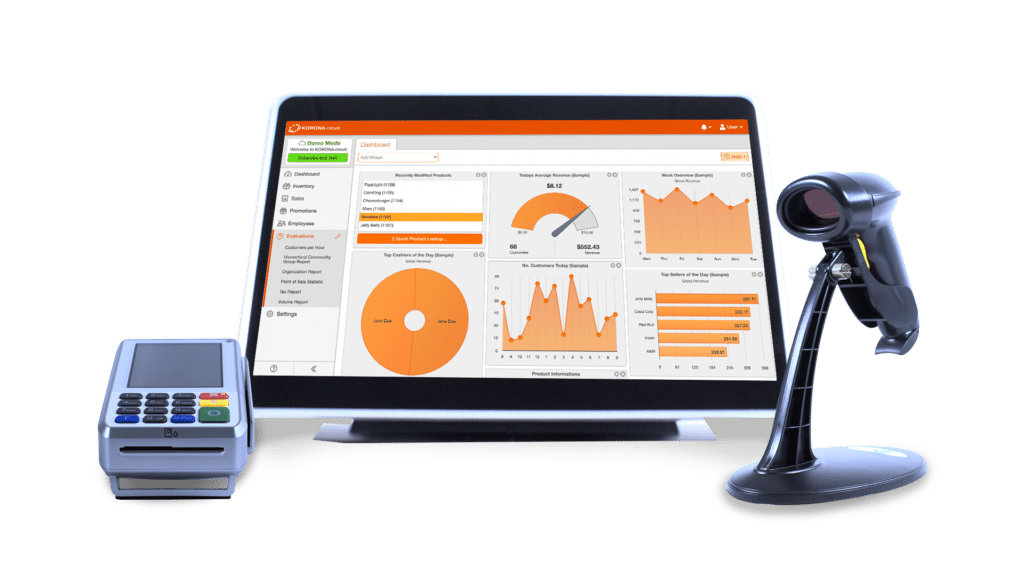
KORONA POS overview
KORONA POS offers a cloud-based solution designed to streamline your retail operations. From managing inventory and processing payments to offering mobile checkout and in-depth reporting,
KORONA POS empowers businesses of all sizes to take control and boost efficiency.

Pros
- Streamlined checkout and payment experience
- Customer loyalty programs and promotions
- Unrivalled customer support
Cons
- Not for all verticals
- Learning curve for all features
Pricing
Core
$59/mo
- Various reporting
- Unlimited users
- Customizable dashboard
Freedom
$69/mo
- Stock management
- Barcode automation
- Price and shelf labels
Adds-on
From $10 to $50/mo
- KORONA integration
- KORONA Plus
- KORONA Invoicing
KORONA POS is headquartered in Las Vegas, Nevada. The company serves various verticals beyond dollar stores, such as retail, hospitality, and amusement parks.
Known for its flexibility and user-friendly interface, KORONA POS supports integrations with eCommerce platforms, making it a versatile choice for businesses looking to manage both online and offline sales channels.
Key Features
- KORONA POS provides advanced inventory management features that help you track stock levels in real-time, set up automated reordering, and effortlessly manage product variations.
- Robust reporting capabilities offer detailed inventory insights through advanced reports such as ABC analysis and product assessments.
- These features ensure you never run out of popular items and can maintain optimal inventory levels, reducing the risk of overstocking and avoiding stockouts.
Pros
- Credit Card Agnostic
Unlike Square, KORONA POS is credit card agnostic, allowing retailers to choose any credit card processor that suits their needs. This flexibility lets businesses shop for the best rates and terms, potentially lowering transaction costs. By not being tied to a single credit card processor, KORONA POS empowers retailers to negotiate better deals and adapt to changing market conditions.
- Customer Loyalty Programs and Promotions
Boost customer retention and sales with KORONA POS’s built-in loyalty programs and promotional tools. Easily create and manage loyalty programs that reward repeat customers and set up promotions to attract new shoppers. Personalized discounts and targeted marketing campaigns help you engage customers effectively.
- Unrivalled Customer Support
KORONA POS offers exceptional customer support that is available 24/7. Whether you need assistance with setup, troubleshooting, or optimizing your system, the dedicated support team is always ready to help. This ensures minimal downtime and uninterrupted business operations, giving you peace of mind.
Cons
- Not For All Verticals
While KORONA POS excels in advanced inventory management and retail operations, it is not ideal for all business verticals. Apparel retailers might find the lack of detailed size and color tracking limiting, opting to go with a great clothing POS system. Grocery stores may miss integrated scale support and specialized inventory features. Additionally, full-service restaurants might require more comprehensive table management and kitchen display systems.
- Learning Curve for All Features
The robust suite of advanced features can present a learning curve for new users. The system’s comprehensive inventory management, detailed reporting tools, and customizable integrations may require time and training to master fully. As a result, businesses might experience an initial adjustment period before fully leveraging the platform’s capabilities.
KORONA POS Pricing
KORONA POS’s pricing offers a tiered, transparent pricing structure with a flat monthly fee per terminal, with no contracts and no hidden charges. Here’s a breakdown:
Base Plans:
- KORONA Core: This starts at $59 per month per terminal. It provides basic POS functionalities like processing sales, managing inventory, and customer receipts.
- KORONA Retail: Priced at $69 per month per terminal, this plan builds on Core features with features like employee management, loyalty programs, and reporting tools. It includes everything in Advanced, plus features like gift cards, age verification, and advanced inventory controls.
Optional Add-on Modules:
KORONA offers industry-specific modules that add functionalities on top of the base plans. These modules typically range from $10 to $50 per month per terminal. Here are some examples:
- KORONA Food: Ideal for restaurants and cafes, this module adds table service features for an extra $10 per month per terminal.
- KORONA Invoicing: Enables sending invoices for $10 extra per month per terminal.
- KORONA Ticketing: This module is suited for amusement parks and similar businesses, priced at $50 per gate per month. It allows managing admissions, memberships, and online ticketing.
- KORONA Franchise: For managing franchises, this module costs $30 extra per franchise location per month.
- KORONA Integration: This allows integrating KORONA with other business applications for an additional $45 per token per month.
Additional Points:
- KORONA POS offers a free trial to try out the software before committing.
- Hardware costs are separate and depend on your chosen devices (tablets, desktops, etc.)
- KORONA emphasizes that their pricing is transparent and has no surprise fees.
KORONA POS is processing-agnostic, meaning the POS can integrate with any major payment processing solution you choose. It also provides POS hardware from tablets, receipt printers, credit card readers, terminals & cash drawers.
Ready to take your business to the next level?
Boost store performance and improve sales with the advanced features and tools KORONA POS offers.
2. Lightspeed: Best Alternative for Apparel Retailers
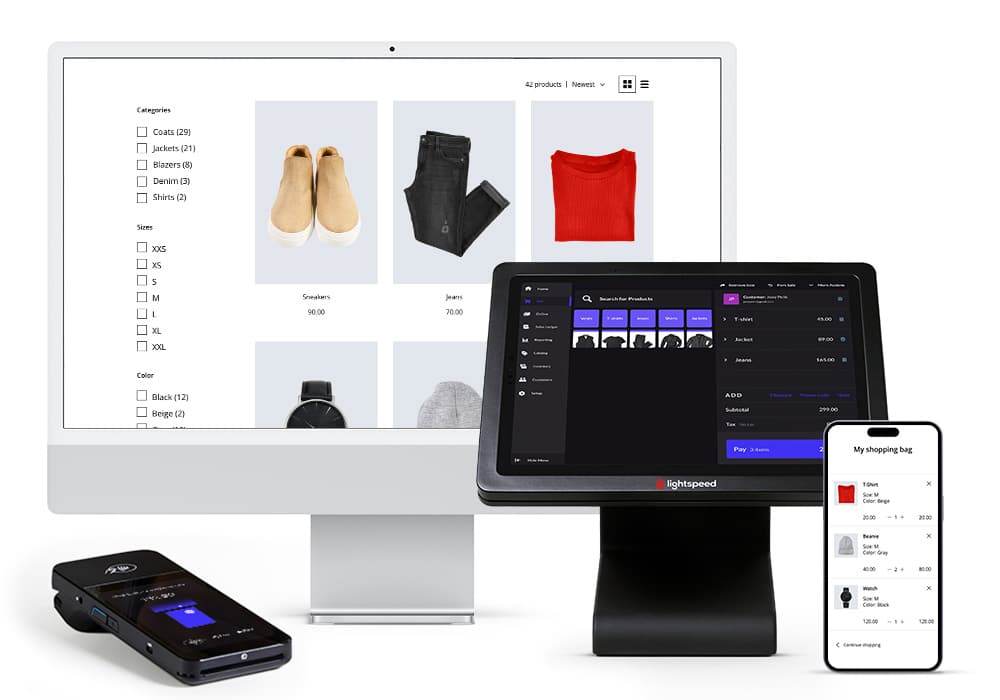
Lightspeed Retail overview
Lightspeed POS goes beyond basic sales. This cloud-based system empowers retailers with features for inventory control, staff management, and marketing tools.
Centralize operations, gain valuable insights, and boost your bottom line with Lightspeed’s comprehensive retail management solution.
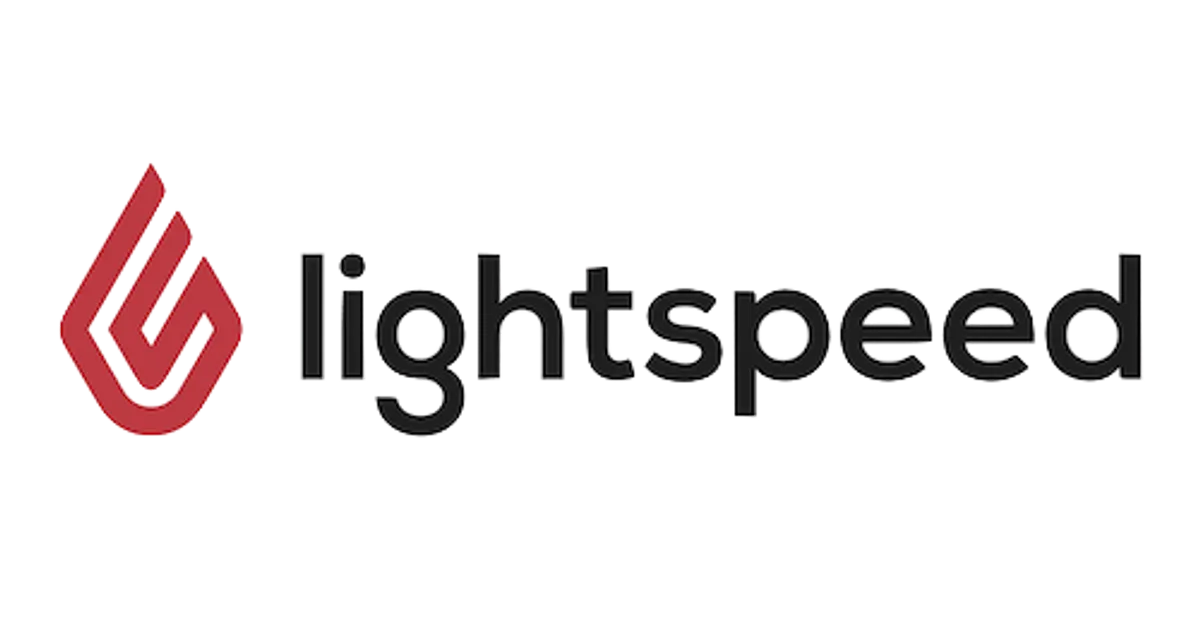
Pros
- Centralized employee management
- Built-in marketing tools
- Cloud-based accessibility
Cons
- Customer service issues
- Dependence on internet connection
Lightspeed Retail Pricing
Basic
$109/mo
- Registers
- Free training and onboarding resources
- Dedicated account manager
Core
$179/mo
- Lightspeed B2B
- Accounting
- eCommerce
Plus
$289/mo
- Omnichannel loyalty
- Advanced reporting
Dax Dasilva founded Lightspeed POS in 2005. The company is headquartered in Montreal and has offices in Canada, Europe, the US, and Australia.
In 2014, Lightspeed acquired a Belgian startup called POSIOS, which specializes in restaurant management and POS. With that acquisition, Lightspeed Restaurant POS was introduced.
Lightspeed has since acquired several other POS businesses, including Vend and Shopkeep.
Key Features
- Lightspeed POS is an excellent solution for apparel retailers due to its vertical-specific inventory management features, which include detailed size and color tracking.
- This functionality ensures that retailers can efficiently manage their stock and precisely meet customer demands.
- Lightspeed POS integrates with NuORDER wholesale platform, allowing apparel businesses to import purchase orders and streamline inventory management.
Pros
- Centralized Employee Management
Manage your team efficiently with Lightspeed POS. Create employee profiles, time tracking, assign permissions, track sales performance, and simplify payroll processes for a streamlined workforce management experience.
- Built-In Marketing Tools
Lightspeed POS helps you connect with your customers. Within the system, you can run targeted email campaigns, launch loyalty programs, and manage retail gift cards. These tools will increase customer engagement and drive repeat business.
- Cloud-Based Accessibility
Access Lightspeed POS from anywhere, anytime. The cloud-based system allows you to manage your business remotely, view real-time reports, and make informed decisions.
Cons
- Customer Service Issues
Many users have reported negative experiences with Lightspeed POS from the beginning. Ineffective support and unresponsive onboarding personnel have exacerbated the issue, leaving businesses without a functional POS solution despite being under contract.
- Dependence on Internet Connection
As a cloud-based POS system, Lightspeed depends entirely on a stable internet connection. Any internet service disruptions could potentially interrupt operations or restrict access to essential functionalities.
Lightspeed Pricing
Lightspeed Retail offers a tiered pricing structure with two main components: monthly subscription fees and optional transaction processing fees. Here’s a breakdown of both:
Monthly Subscription Fees: Lightspeed Retail provides three plans with varying functionalities:
- Lean ($109/month): The most basic plan, ideal for small businesses with minimal needs. It includes features like basic inventory management, POS functionality, and customer management.
- Standard ($179/month): Suitable for growing businesses, this plan includes everything in the Lean plan plus features like employee management, advanced reporting, and loyalty programs.
- Advanced ($289/month): This top-tier plan is designed for businesses with complex needs. It offers everything in the Standard plan, along with gift card management, age verification, and advanced inventory controls.
Additional Factors Influencing Monthly Cost:
- Annual billing discount: Lightspeed offers a discount for opting for annual billing instead of monthly payments.
- Number of locations: The base price covers one location; additional locations incur extra charges.
- Number of registers: Similar to locations, extra registers may require additional fees.
Transaction Processing Fees: Lightspeed allows you to use their integrated payment processing or a third-party processor. If you choose Lightspeed’s processing, transaction fees are based on the type of transaction:
- In-Person transactions: 2.6% + 10 cents per transaction
- Online transactions: 2.9% + 30 cents per transaction
- Business size: Larger merchants may be able to negotiate lower processing rates
Additional Considerations:
- Hardware Costs: Lightspeed’s base plans do not include hardware such as barcode scanners or receipt printers. These additional costs should be considered.
- Free Trial: Lightspeed offers a 14-day free trial to test their software before committing.
3. Shopify: Best Alternative for Omnichannel Retail
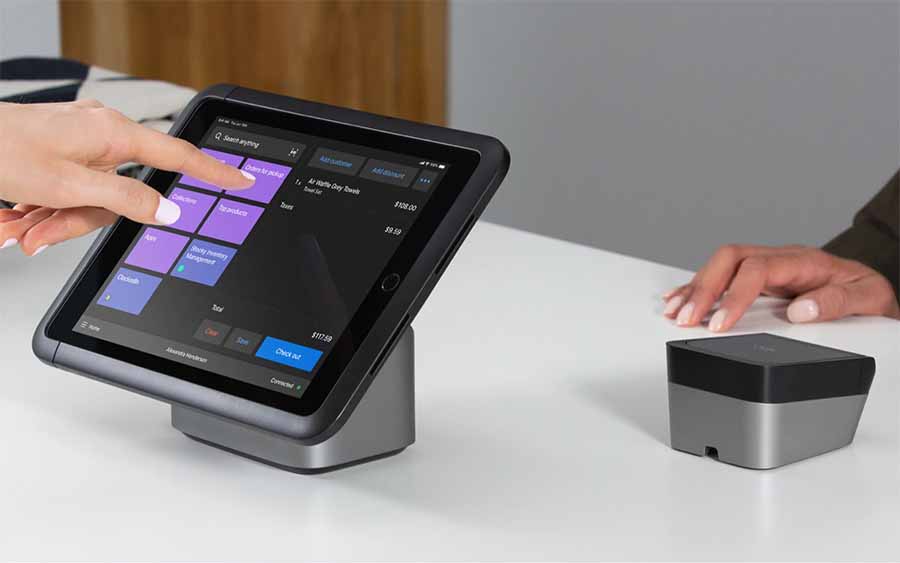
shopify POS overview
Unify your online and in-store experience with Shopify POS. This intuitive system lets you manage sales, inventory, and customers from a single platform.
Offer contactless payments, track trends with insightful reporting, and sync everything seamlessly with your Shopify online store.
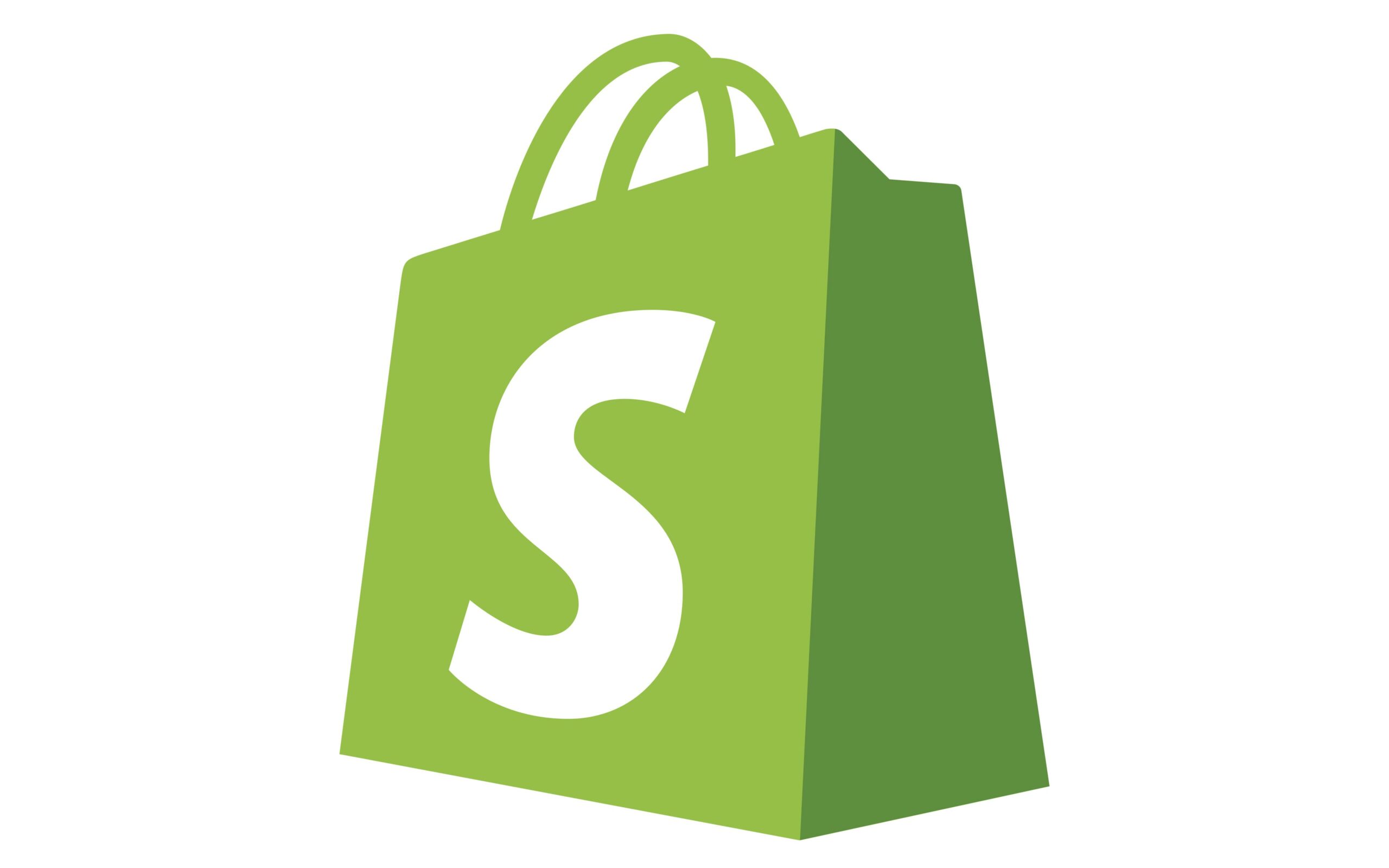
Pros
- Unified inventory management
- Effortless checkout options
- User-friendly interface
Cons
- Third-party processing costs more
- Built with omnichannel in mind
Pricing
Basic
$29/mo
- For “solo entrepreneurs”
- Shipping discounts
- 24/7 support
Shopify
$79/mo
- For “small teams”
- Additional staff logins
- Lower processing rates
Advanced
$299/mo
- For scaling a business
- Custom reporting
- Enhanced support
Plus
$2300/mo
- For “more complex businesses”
- Unlimited staff accounts
- Customizable checkout
Shopify POS was initially developed to power an online snowboard equipment store. It quickly evolved into a comprehensive eCommerce platform. In 2013, Shopify expanded its offerings to provide brick-and-mortar retailers with a POS to bridge their physical and online stores.
Their headquarters are in Ottawa with additional offices in Toronto, Montreal, and numerous other locations worldwide.
Key Features
- Shopify was initially built as an eCommerce platform.
- Its strong foundation for seamless online and in-store POS integration makes it ideal for omnichannel businesses.
- Shopify’s POS system allows businesses to manage their inventory, sales, and customer data across all channels from a single, user-friendly interface, ensuring a consistent shopping experience.
See our full comparison of Shopify vs Square POS.
Pros
- Unified Inventory Management
Say goodbye to stock headaches. Shopify POS automatically syncs your online and in-store inventory levels. Manage stock levels from a central hub, receive low-stock alerts, and avoid costly overselling or stockouts.
- Effortless Checkout Options
Empower your customers with flexible checkout options. Shopify POS supports various payment methods, including contactless payments, mobile payments, split tenders, and gift cards. Reduce wait times and enhance customer satisfaction.
- User-Friendly Interface
Shopify POS boasts an intuitive and user-friendly interface. Employees with limited tech experience can quickly learn the system, minimizing POS training time and ensuring smooth operations. It also offers a mobile card reader for flexibility.
Cons
- Third-Party Processing Costs More
Shopify POS encourages retailers to use Shopify Payments. Businesses that prefer to use a third-party payment processor must pay an additional transaction fee.
- Built with Omnichannel in Mind
Shopify was designed with omnichannel retailers in mind, providing seamless integration between online and in-store operations. Its comprehensive features and higher costs may benefit only brick-and-mortar businesses operating through various channels. These retailers might find the platform’s extensive capabilities unnecessary and the associated expenses less justifiable than more straightforward and cost-effective solutions.
Shopify POS Pricing
Shopify offers three pricing plans for retail businesses: Basic, Shopify, and Advanced.
Basic Plan:
Designed for solo entrepreneurs, with a monthly subscription of $32 USD. Features include card rates starting at 2% for 3rd-party payment providers, 10 inventory locations, 24/7 chat support, localized global selling in 3 markets, and POS Lite.
Shopify:
Geared towards small teams at a monthly subscription price of $92 USD. Features include card rates starting at 1% for 3rd-party payment providers, 5 additional staff accounts, and POS Lite.
Advanced:
Ideal for scaling businesses, with a monthly subscription of $399 USD. Features include custom reports and analytics, 10 inventory locations, enhanced 24/7 chat support, localized global selling in 3 markets (with the option to add more for $59 USD/mo each), 15 additional staff accounts, 10x checkout capacity, POS Lite, and 0.6% card rates for 3rd-party payment providers.
Plus:
Tailored for complex businesses, starting at $2,300 USD/month on a 3-year term. Features include competitive rates for high-volume merchants, custom reports and analytics, 200 inventory locations, priority 24/7 phone support, localized global selling in 50 markets, unlimited staff accounts, and fully customizable checkout.
Additional information
- Start with a free trial: You can try Shopify for free for 3 days, and no credit card is required.
- Flexible subscription plans: After the trial, you select a plan that matches your business’s size and stage. Most plans operate on a month-to-month basis, but yearly plans are available.
- Shopify Plus option: Shopify Plus offers 1- or 3-year terms. With these plans, you can cancel at the end of your commitment period.
- Discounts for yearly subscriptions: Enjoy a 25% discount on Basic, Shopify, or Advanced plans with a yearly subscription.
- Special benefits for Shopify Plus: Opting for a 3-year Shopify Plus plan provides monthly discounts and reduced online variable platform fees.
KORONA POS has exceeded my expectations in every way. It’s a powerful, adaptable solution that has transformed our operations for the better.
-James B.
4. Toast: Best Alternative For Restaurants
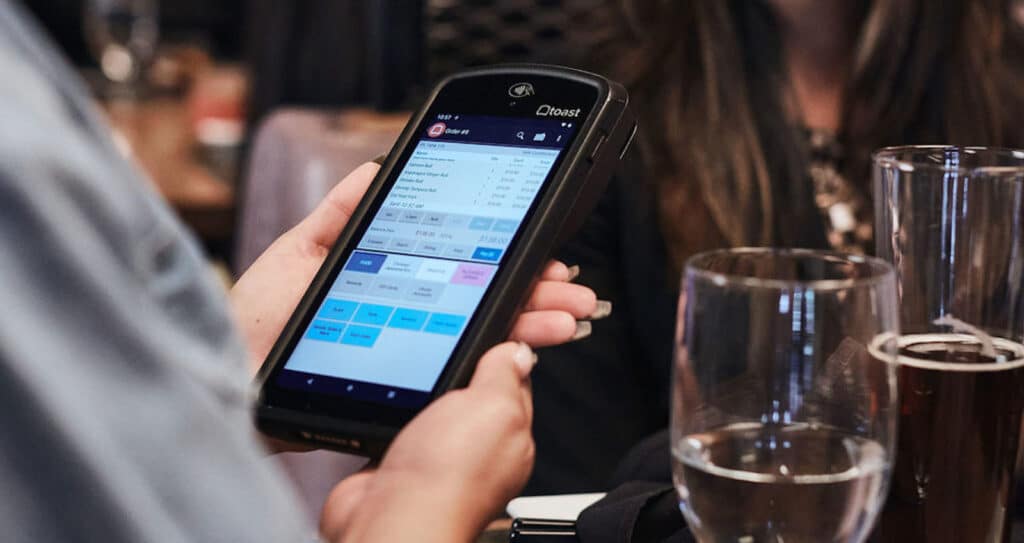
Toast POS overview
Toast stands out as an excellent platform explicitly tailored for restaurants. It offers comprehensive features like table and order management, mobile POS capabilities for tableside ordering, and seamless integration with kitchen display systems (KDS).
These functionalities streamline operations, reduce errors, and enhance the dining experience. With robust inventory management, online ordering options, and detailed reporting tools, Toast empowers restaurants to optimize efficiency, improve customer service, and make data-driven decisions to boost profitability.
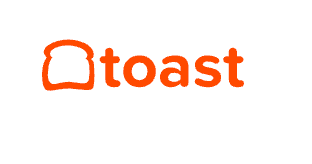
Pros
- Inventory management built-in
- Integrated online ordering & payments
- Detailed reporting and analytics
Cons
- Mixed customer support reviews
- Contract required
Toast POS Pricing
Starter Kit:
$0/mo
- Reporting & analytics
- Menu management
- Toast invoicing
Core
$69/mo
- Toast mobile order and pay
- Toast delivery services
- Scheduling, powered by Sling
Build Your Own
Custom Pricing
- Payroll & team management
- Toast pay card and payOut
Toast is a restaurant management software company founded in December 2011 by Aman Narang and Steve Fredette in Boston, Massachusetts. Their first focus was providing mobile payments and loyalty for restaurants across the US.
They’ve since become a leading all-in-one restaurant POS with over 112,000 clients.
Key Features
- Toast is specially designed for the food service industry, with comprehensive table and order management capabilities.
- Mobile POS equips your wait staff to take orders and serve guests tableside.
- Kitchen display systems (KDS) seamlessly integrate with Toast to send orders directly to the kitchen in real-time, improving communication, reducing preparation errors, and expediting order fulfillment.
If you’re in the food business, you may also want to see our Revel Vs Square POS comparison.
Pros
- Inventory Management Built-In
Track restaurant inventory levels with ease. Toast allows you to manage food costs, set par levels, and receive low-stock alerts to optimize inventory control and minimize waste.
- Integrated Online Ordering & Payments
Toast offers the convenience of online ordering and payment processing. Customers can order takeout or delivery directly from your website, increasing sales opportunities and streamlining the ordering process.
- Detailed Reporting and Analytics
Gain valuable insights with Toast’s robust reporting tools. Analyze sales trends, identify popular dishes, and track staff performance to make data-driven decisions and improve your restaurant’s operations.
Cons
- Mixed Customer Support Reviews
Toast POS has received varied reviews for its customer service, with some users praising its responsiveness and helpfulness in resolving issues promptly. However, others have reported delays and inconsistency in support, affecting operational efficiency and customer satisfaction. Prospective users should consider these mixed experiences when evaluating Toast POS for their restaurant management needs.
- Contract Required
Toast POS requires a two-year contract commitment and imposes early termination fees, which can be a significant consideration for restaurants exploring their options. This contractual obligation may limit flexibility for businesses seeking shorter-term commitments or looking to switch providers without financial penalties.
Toast Pricing
Toast POS pricing has two main parts: software and hardware costs, plus payment processing fees.
Software Costs
- Starter Kit ($0/mo): It includes basic features like reports and menu management. This system is best for small restaurants that just need one or two terminals and basic reporting features. It requires you to use their payment processing (2.49% + $0.15 per transaction).
- Core ($69/mo): The plan offers multiple add-ons not found with the Starter Kit, including team management tools and API access.
- Custom pricing: This solution is best for larger restaurant operations that seek to drive more revenue and optimize operations with the full Toast platform.
Hardware Costs
The cost of Toast hardware varies based on each customer’s specific requirements. Nonetheless, Toast’s hardware offerings encompass a diverse range of products, including Toast Flex, Toast Go 2, Toast Flex for Guest (a customer-facing display), Toast Flex for Kitchen, a Kiosk, Toast Tap (available in both On Counter and Direct Attach configurations), Toast Printer, Impact Printers, Toast Hub, wireless access points, routers, cash drawers, card readers, barcode scanners, scales, flip stands, and wall mounts.
Payment Processing Fees
Toast requires you to use their payment processing service. Fees typically range from 2.49% to 3.69% per transaction, plus a flat fee per transaction. Toast offers custom quotes for potentially lower rates for businesses with large revenue. These quotes are only available for restaurant owners with a good financial history and an established restaurant.
Want to know exacTLy what you’ll spend with toast POS?
Check out our Free Toast POS Cost Calculator and run the numbers for yourself.
5. Loyverse: Best Free Alternative
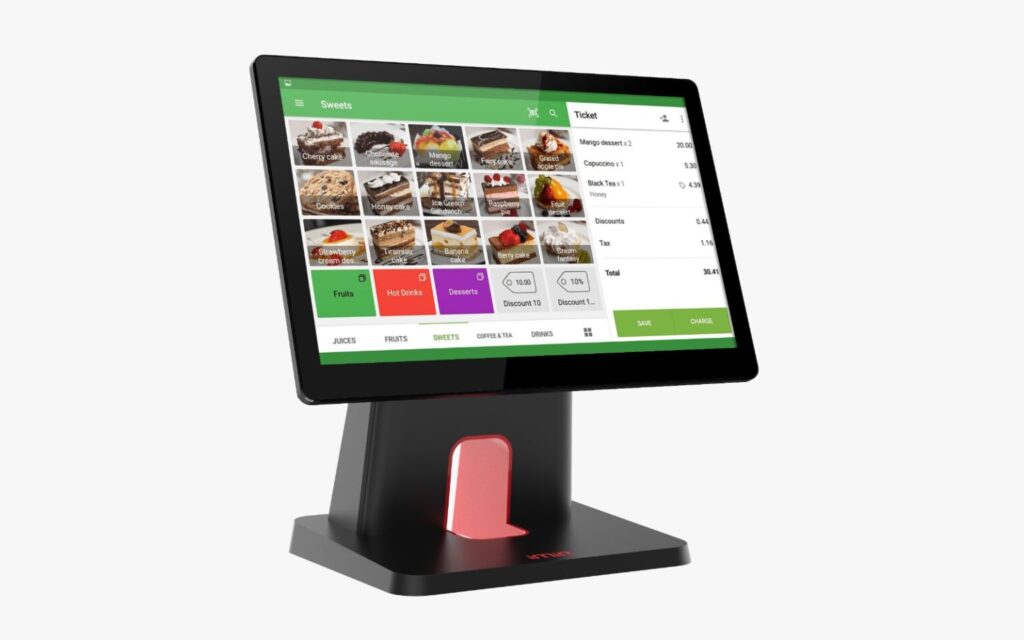
overview
Loyverse offers a robust free POS system with features for managing inventory, sales, and basic customer data. You can use it on your phone or tablet, track sales trends, and even connect a receipt printer—all without paying a dime.
Upgrade for advanced features like employee management or integrations with other business tools.
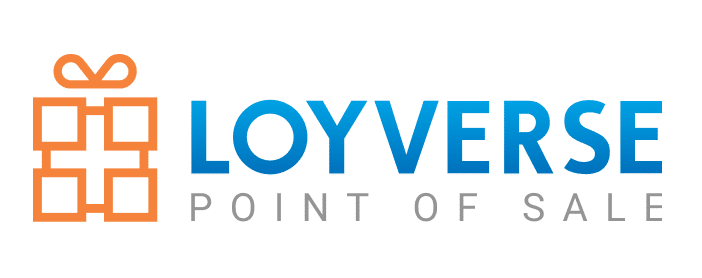
Pros
- Cloud-based accessibility
- Offline functionality
- Customer management
Cons
- Advanced features not free
- No phone support
Loyverse Pricing
Loyverse POS
$0/mo
- Runs on Android and iOS
- Multi-store options
- Sales analytics
Loyverse Add-Ons
$9 to $59/mo
- Employee management
- Advanced inventory
- Integration capabilities
Loyverse stands for Loyalty Universe. The company was founded in 2014 and has its listed headquarters in Cyprus.
Loyverse has clients worldwide and serves several retail verticals including convenience, grocery, apparel, bike shops, furniture, bakeries, and more.
Key Features
- With Loyverse, you can manage products, process sales, track inventory, and generate simple reports—all for free.
- The intuitive app is ideal for startups or businesses with a limited budget.
- The platform was initially designed as a loyalty program, and that aspect still shines in the current technology.
Pros
- Cloud-Based Accessibility
Access Loyverse from any device with an internet connection. Manage your business on the go, view real-time sales data, and never lose your information.
- Offline Functionality
Loyverse functions even without internet connectivity. Transactions are stored locally and synced when reconnecting, ensuring smooth operations during brief internet outages.
- Customer Management
Store basic customer information, such as contact details and purchase history. This allows for simple customer recognition and potential future marketing initiatives.
Cons
- Advanced Features Not Free
Advanced capabilities such as employee management, enhanced inventory management, and integrations come with an additional monthly fee. These added costs can quickly add up, making it necessary for businesses to carefully consider which features are essential for their operations.
- No Phone Support
Loyverse provides customer support through chat assistance but lacks a direct phone line for technical support. This limitation can lead to challenges for businesses during emergencies, potentially resulting in lost sales due to operational downtime.
Loyverse Pricing
Loyverse is free to use for the basic setup and runs on tablets.
From there, users can choose from different add-ons. All add-ons have a 14-day trial period. Retailers paying annually will receive two months free.
These add-ons include:
- Employee management for $25 per month
- Advanced inventory for $25 per month
- Integration capabilities for $9 per month
All annual payments come with two free months of any add-on.
6. IT Retail: Best for Integrated Grocery Scales
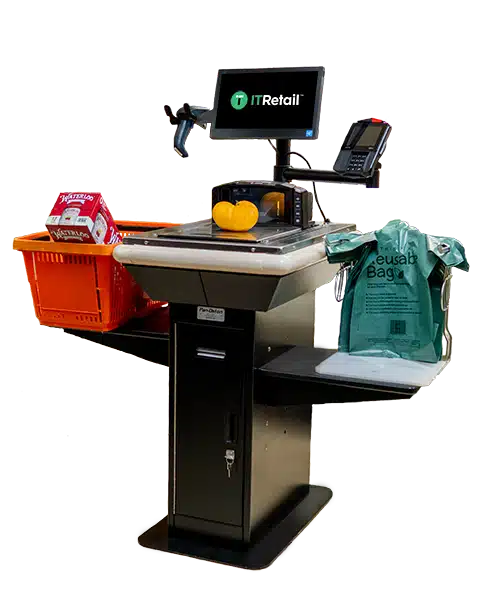
IT Retail overview
IT Retail offers an excellent self-checkout system for grocery businesses. The system features built-in scales to ensure accurate pricing for produce and other weighted items. It enhances customer convenience by streamlining the checkout process and reducing wait times.
With its intuitive interface and robust integration with inventory management, IT Retail’s self-checkout solution is a reliable and efficient choice for modern grocery stores.

Pros
- Age Verification and Food Stamps
- Recipe management and meal deals
- Real-time sales data and reporting
Cons
- No processing flexibility
- No free trial
Pricing
Starts at $99/month and goes up from there
- 24/7 support
- No contract necessary
IT Retail is based in Riverside, California. The company has a long history of serving grocery stores and supermarkets, offering solutions tailored to meet the needs of high-volume retail environments. IT Retail’s software also supports various payment options, promotions, and discount management, enhancing its appeal to diverse retail sectors.
Key Features
- IT Retail integrates seamlessly with various grocery scales.
- Eliminate manual data entry and streamline the weighing and checkout process for produce and bulk items.
- IT Retail offers expiry date tracking, automated low-stock alerts, and waste management features to optimize grocery product inventory control.
Pros
- Age Verification and Food Stamps
With IT Retail’s built-in functionalities designed for specific grocery needs. Ensure compliance with age restrictions for particular items and manage food stamp transactions efficiently.
- Recipe Management and Meal Deals
Create digital recipes within the system and link ingredients to simplify inventory management for recipe-based products. To boost sales, offer eye-catching meal deals and promotions.
- Real-Time Sales Data and Reporting
Gain valuable insights with real-time sales analytics and in-depth reporting tools. Track sales trends, identify popular grocery items, and optimize pricing strategies based on customer buying patterns.
Cons
- No Processing Flexibility
IT Retail forces business owners to use their payment processing services exclusively, limiting the ability to shop around for competitive rates. This lack of flexibility may result in higher transaction fees than other processors offering better rates or tailored solutions.
- No Free Trial
IT Retail does not provide a free trial option for businesses to test its system and assess its suitability for retail operations. This lack of a trial period can deter potential users seeking to evaluate the platform’s features and performance before committing.
IT Retail Pricing
The price difference for the software bundles mainly depends on the quality of the POS hardware you want. The features are mostly the same across bundles.
Software Bundles
IT Retail offers three main bundle packages:
IT Retail Flex Monthly: $99 per month
- This is the simplest plan. It includes 24/7 support and unlimited training. For hardware, this monthly option comes with a basic touchscreen PC, receipt printer, barcode scanner, cash drawer, and chip reader.
IT Retail Freedom Standard: $1,499 Hardware Bundle + $99 per month
- This bundle has more advanced hardware, including a pin pad with a stand, a wide-screen POS terminal, a sleek cash drawer, and a customer-facing display. All hardware in this package has a two-year warranty.
IT Retail Freedom Premium: $1,999 Hardware Bundle + $99 per month
- This premium package includes everything in the Freedom Standard bundle, plus a premium POS terminal display and a larger customer display.
Processing fees and contracts
All plans and bundles need an integrated processing agreement. IT Retail mentions that their packages do not require any long-term contracts.
Other potential alternatives:
The Best Square POS Alternatives
When exploring alternatives to Square POS, it’s crucial to recognize that each business vertical and company has unique operational needs. Whether you’re in retail, apparel, restaurants, or omnichannel sales, selecting the right POS system involves asking the right questions and thoroughly evaluating your options.
It’s wise to shop around and compare systems to find the best fit that enhances operational efficiency and meets specific business requirements. For retailers with complex product lists and a focus on efficient stock organization, KORONA POS stands out with its robust inventory management features. To learn more about how KORONA POS works, click below.

